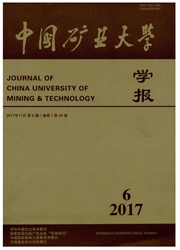

 中文摘要:
中文摘要:
根据电化学理论讨论了钢筋腐蚀动力学中混凝土电阻影响及腐蚀控制模式2个基本问题,推导了钢筋腐蚀的阴阳极极化方程及腐蚀电位表达式,分析了影响钢筋腐蚀速率的若干主要因素.结果表明,混凝土电阻通过影响腐蚀电极的极化阻力间接影响钢筋腐蚀速率;腐蚀的直接阻力仅仅来自极化阻力;当混凝土孔隙水含量极高时,腐蚀速率由氧浓差极化控制,并与含水率呈减函数关系,反之,则由电化学极化控制,并与含水率呈增函数关系;钢筋应力增大可以提高电化学极化控制下的腐蚀速率,但对氧浓差极化控制下的腐蚀速率并无影响;保护层厚度增大可以减小氧浓差极化控制下的腐蚀速率,但对电化学极化控制下的腐蚀速率并无显著影响.
 英文摘要:
英文摘要:
Based on the electrochemical theories, the effects of concrete resistance and corrosion control modes in the corrosion kinetics of steel bars were discussed. Polar equations and corrosion potential expressions at the cathode and anode of the corroding steel bars were obtained. The principle factors affecting the corrosion rate were analyzed. The results show that the resistance of the concrete affects the corrosion rate indirectly by polarization resistance. The rate is controlled by concentration polarization of oxygen in the presence of abundant pore water. The rate decreases with increasing water content under these conditions. Otherwise the rate is controlled by electrochemical polarization and increases as the water concentration increases. Stress in the bars will further increase the corrosion rate when it is controlled by electrochemical polarization. Stress has no effect in the oxygen polarization regime. Thickening concrete cover can reduce corrosion in the oxygen polarization regime but has no effect when the rate is controlled by electrochemical polarization.
 同期刊论文项目
同期刊论文项目
 同项目期刊论文
同项目期刊论文
 Field inspection on chloride ion-intrusion effect of seawater in dry-wet cycling zone of concrete st
Field inspection on chloride ion-intrusion effect of seawater in dry-wet cycling zone of concrete st Determination and application of the sharp degradation point of concrete under environmental actions
Determination and application of the sharp degradation point of concrete under environmental actions Spatial variability-based corrosion risk assessment and strategy of repair and maintenance for RC st
Spatial variability-based corrosion risk assessment and strategy of repair and maintenance for RC st 期刊信息
期刊信息
